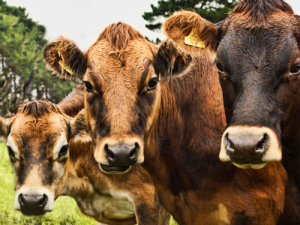NZ Catchment Groups Thrive with ‘Source to Sea’ Approach
The most successful catchment groups in NZ are those that have 'a source to sea' approach.
 Animal health experts are warning that the outbreak of Mycoplasma bovis disease on a large South Canterbury farm could be “a potential game changer”.
Animal health experts are warning that the outbreak of Mycoplasma bovis disease on a large South Canterbury farm could be “a potential game changer”.
Animal health experts are warning that the outbreak of Mycoplasma bovis disease on a large South Canterbury farm could be “a potential game changer”.
Massey University academics Richard Laven and Kevin Lawrence say farmers should be extremely concerned.
“The disease is very difficult to control or eradicate and can be a major cause of production losses on dairy farms," they told Rural News.
Use of winter housing may encourage the spread of the disease; in the UK some dairy farms have gone bankrupt after contracting Mycoplasma bovis.
Laven is associate professor in production animal health and Kevin Lawrence a senior lecturer in pastoral livestock health at Massey.
They say while the disease poses no risk to humans, there is a "real risk that the disease will spread and become a major problem in the New Zealand dairy industry”.
Ministry of Primary Industries (MPI) is investigating the outbreak; 14 cows have tested positive and about 150 cows on the 1000-cow property have clinical signs that indicate they may be affected. It is now tracing movements of animals on and off the property to ascertain if other properties are at risk.
MPI director of response Geoff Gwyn says Mycoplasma bovis does not infect humans and presents no food safety risk. There is no concern about consuming milk and milk products.
The disease is commonly found in cattle globally, including in Australia, but was never detected before in NZ.
The bacterial disease has serious effects on cattle including udder infection (mastitis), abortion, pneumonia and arthritis.
Laven and Lawrence are backing MPI’s response, but say it is handicapped by farmers not recording their cattle movements through NAIT.
“This will slow their ability to trace the spread of the disease and their ability to respond quickly, which will probably make the difference in the end. An additional worry is because of the long, slow chronic nature of the disease it is highly likely it has already spread at least locally.”
They are urging farmers who recently bought or leased dairy cows originating from Canterbury or Otago to be most vigilant.
Affected cows will have unusual cases of mastitis (especially where all four quarters are affected and/or treatment is unsuccessful), late abortions with weak calves, arthritis in adult cattle (again non-responsive to treatment) and pneumonia in housed calves.
Laven and Lawrence don’t think the outbreak will cause alarm among dairy customers overseas.
“The disease is already present in many other dairying countries. But they may be more concerned that our biosecurity measures have not prevented the incursion of a major bovine pathogen.”
The Meat Industry Association of New Zealand (MIA) today announced that Chief Executive Officer Sirma Karapeeva has resigned from the role.
The winners of the 2026 Hawke’s Bay/Wairarapa Dairy Industry Awards were announced at the annual awards dinner held at Copthorne Solway Park in Masterton on Thursday evening.
Environment Southland is welcoming this week’s decision by the Environmental Protection Authority (EPA) to approve the release of Blaptea elguetai, a leaf‑feeding beetle that will help control the highly invasive Chilean flame creeper.
This March, the potato industry is proudly celebrating International Women’s Day on 8 March alongside the International Year of the Woman Farmer, recognising the vital role women play across every part of the sector — from paddocks and packhouses to research, leadership, and innovation.
Fruit trader Seeka posted a record profit and returns to shareholders in 2025.
Recent weather events in the Bay of Plenty, Gisborne/Tairawhiti, and Canterbury have been declared a medium-scale adverse event.

OPINION: A mate of yours truly reckons rural Manawatu families are the latest to suffer under what he calls the…
OPINION: If old Winston Peters thinks building trade relations with new nations, such as India, isn't a necessary investment in…